Reflections on the Canadian Canoe Pilgrimage – Part One
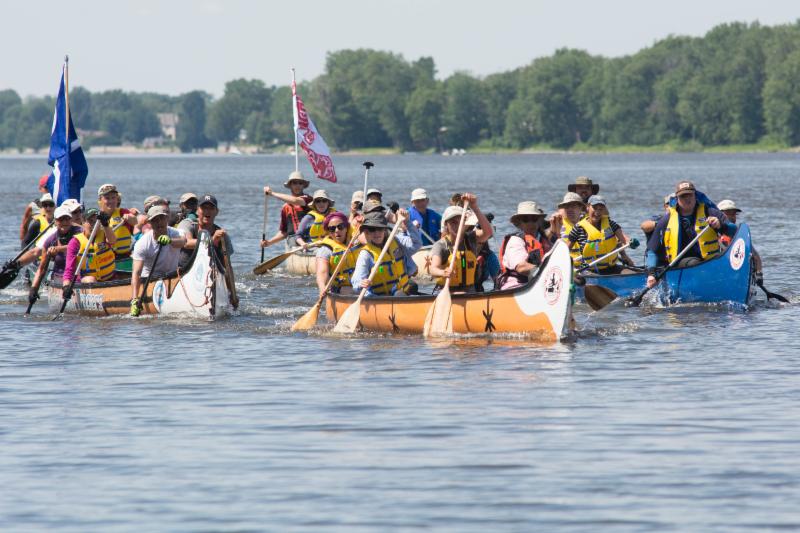
This summer five students from St. Paul’s – the Jesuit high school in Winnipeg – spent five days participating in the Canadian Canoe Pilgrimage which travelled from Midland, Ontario to Montreal. Today and next week, igNation is pleased to post the reflections of these students on their pilgrimage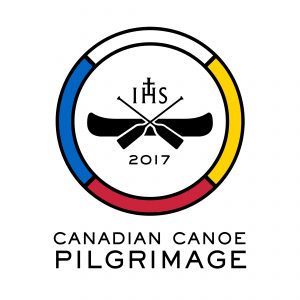
++++++++++++++++++++++++++++++++++++++++
“I instantly wanted to go for many reasons.”
by Aidan Andrew-Hodgert
This summer I had the pleasure of joining the Canadian canoe pilgrimage for five days as a representative of our school. The Pilgrimage was a trip from Lake Nipissing to Montreal, with a purpose of promoting reconciliation between the First Nations, French and English peoples of Canada.
When I heard that the school was going on a canoe trip I instantly wanted to go for many reasons. I not only wanted to attend this trip because I was interested in the outdoors but also because I am interested in working in efforts towards reconciliation.
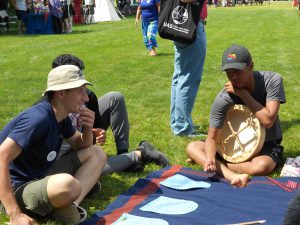
Aidan plays the moccasin game.
There is a lot of talk surrounding reconciliation and aboriginal peoples but I felt that not a lot of action was happening. It felt important to me to be personally involved in the healing process between Indigenous peoples and the Catholic Church.
Furthermore, I wanted to be a part of the Canadian Canoe Pilgrimage because I wanted to explore Canada and get a better understanding of our history.
I have an interest in the history of our indigenous peoples and I wanted to learn more about their cultures and their important role in shaping Canada. Throughout the trip I feel I was able to accomplish these things.
Before the trip I saw reconciliation with aboriginal people as merely a call to seek forgiveness for the participation of the Church and government in residential schools and their effects.
The pilgrimage changed this because I now see that the steps toward reconciliation are much more than this.
I believe that it is also a duty of all Canadians to learn and take the time to understand the aboriginal culture first, before attempting to heal the wounds of the past.
Throughout the trip we were introduced to different aboriginal rituals, ceremonies and traditions. On the first day we were in North Bay and we participated in an offering ceremony to Mother Earth, where we prayed and offered berries and tobacco so that Mother Earth would look over the environment for us.
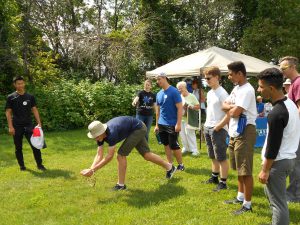
A traditional Mets game.
My experience with the aboriginal rituals was very moving, many of them were very spiritual and made me feel at ease.
There was an aboriginal family who travelled with the Canoe Pilgrimage for the duration while we were there and it was very important for me to see. I had never really interacted with an aboriginal family before and they are a beautiful family.
I saw that through their culture they were very connected spiritually with each other, and were much closer to each other than many families in certain ways. The family was very generous to us in sharing some aspects of their culture with us.
They introduced us to aboriginal games, such as a lacrosse variation and the “moccasin game”, where we were all able to connect.
Bob, an aboriginal elder, led us through a pipe ceremony and he showed us similarities between Catholicism and his culture. He helped me to realize that our culture is not as different as that of the First Nations.
Being on the water was probably the most enjoyable part of the trip. We were on the water for long distances where we had plenty of time for conversation. Through these conversations and experiences I was able to learn quite a lot about the land and the people I was travelling.
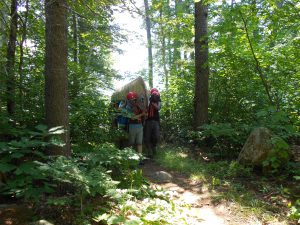
On portage.
By travelling and conversing with Jesuits, I was given the opportunity to deepen my faith. I found peace when there was no conversation on the canoe, and I was able to take in God’s creation and reflect.
I found myself developing a stronger feeling towards preserving God’s creation and wanting to immerse myself deeper into nature. I feel I was truly able to appreciate the life and creation of God. I very much enjoyed and would recommend that others seek out similar opportunities.
I enjoyed the sense of freedom of being out in the wilderness, but I believe that I am most grateful for the opportunity for spiritual connection and a higher connection with my catholic faith.
+++++++++++++++++++++++++++++++++++++++++++
” I now know reconciliation is making a difference..”
by Michael Asabil
The 2017 Canadian Canoe Pilgrimage was an experience that my friends and I will never forget.
The purpose of this trip was to help encourage reconciliation between the First Nations, Jesuits, and all people of Canada. There was a diverse group of people with different races, genders, and religions.
During this trip, everyone was treated as equals and we all had one common goal and that was to canoe. The Canoes acted as a bridge that helped us to connect to one another and find out about each other’s life experiences and struggles.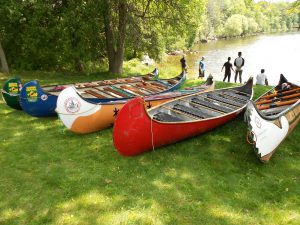
The reason I wanted to attend this pilgrimage was to bond with my friends and make plenty of new memories.
I also realized there was going to be a spiritual aspect going into the trip and was excited to gain more knowledge about not just the Christian religion but plenty of others including those of the First Nations.
I have always been interested in camping and this trip provided me an opportunity to learn many new skills. The entire St. Paul’s group was shocked to find out how much work was needed to get through the day.
Everyone on the trip had to work together and different tasks were assigned to everyone. The tasks went from making and cleaning up breakfast and dinner to portaging heavy 7- man canoes.
This pilgrimage was definitely not a walk in the park, but the busy schedule helped us appreciate the free time we had that much more. A pilgrimage can be defined as a journey that usually has some religious aspects within it.
I didn’t realize how much that I would be reflecting and praying, but I often found myself in constant reflection on the topics that were being talked about. The pilgrimage was very fun and helped me realize many things.
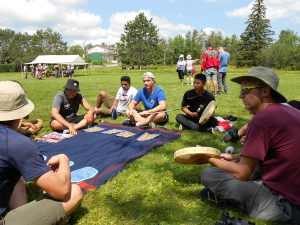
Playing the Ojibwe Mocassin Game
Traveling with the Jesuits was great because all of them were very nice and generous. I felt like they really cared for me and my needs by helping us adapt to the new conditions we were facing. Even though they didn’t know us they accepted us and gave some great advice.
This trip helped me grow more spiritually by giving me many hours in the canoe to be with my thoughts and to reflect after the many masses. During the trip, we met many different peoples of faith from Curtis McKenzie nSJ and Father Dave to the lovely sisters from Sault Ste. Marie.
The pilgrimage helped me dive deeper into my own faith but it also opened my eyes to the idea of reconciliation. Before the trip the word reconciliation was just a term that I learned in Canadian History class.
Throughout the year I acknowledged that Aboriginals did suffer and went through a lot in residential schools. Before the Canadian history class in general I had a negative outlook on the Aboriginals in downtown because of the thugs I have seen and stories that I’ve heard.
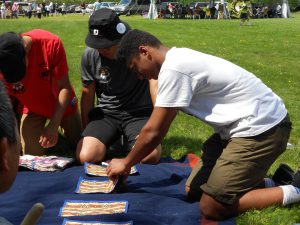 But after finishing Canadian History I began to realize the effects of the residential schools are still alive and damaging people to this day.
But after finishing Canadian History I began to realize the effects of the residential schools are still alive and damaging people to this day.
I never understood how reconciliation could help, but after attending this pilgrimage and seeing the positive outcomes with the love and friendships made between the Jesuits, aboriginals, and all other ethnic groups that attended the trip, I now know reconciliation is making a difference.
+++++++++++++++++++++++++++++++++++
3: “Each canoe was like a family.”
by Jubin Dabas
As the school year came to an end, my friends convinced me to go on this “canoe trip”. I had no idea what the trip was about.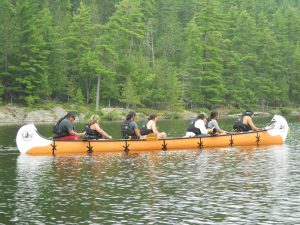
I asked Mr. Havixbeck for more information, and after reading the trip itinerary I decided go without giving it much thought because I thought it would be a good time with the boys.
After all it was just a trip where we would canoe in the middle of the summer with a bunch of other people. I was totally wrong; this trip was nothing like I imagined it to be. After around 75 kilometers and 4 days of paddling I realized how much this trip had changed me.
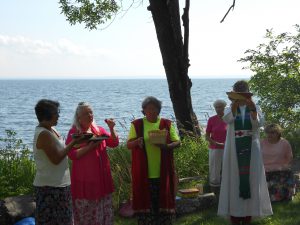
The water ceremony.
The whole pilgrimage was from Midland, Ontario to Montreal, Quebec, around 850 kilometers which was to be completed in 26 days. The Jesuits passed this way before on a similar trip in 1967 when two dozen paddled the same route. It was a celebration marking Canada’s centennial.
This trip had a very different meaning behind it; it was to reconcile with the First Nations people whose children were taken away to residential schools through a similar route.
The residential school was run by Jesuits. After knowing all these facts about the trip, I felt a lot different about the trip, it was no longer just a school trip that was supposed to be just fun.
I learned and realized a lot of things on this trip. Being on the water, with people that I had just a few hours with, and watching them care for each other like family was a great feeling. Each canoe was like a family and all the canoes together made a bigger family that had one main goal and that was reconciliation.
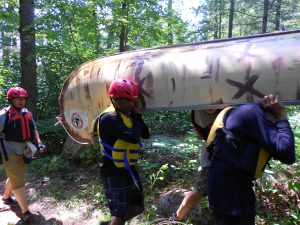 People that came on the trip with their own intentions, maybe they needed a break from a their normal life and figure things out while canoeing for a great cause. The canoes were really heavy so it took around 10-12 people for each canoe to be transported to other spots.
People that came on the trip with their own intentions, maybe they needed a break from a their normal life and figure things out while canoeing for a great cause. The canoes were really heavy so it took around 10-12 people for each canoe to be transported to other spots.
Everyone was really eager to help out and that made us want to help too. Team work is one of the most important things for paddling, everything has to be in sync and balanced.
I realized this on the trip as we made several switches on the canoe, moved from one side to the other, if one person didn’t switch it would result in the canoe tipping over. That made me realize that our life needs to be balanced too or we would tip over.
In conclusion, this was a great humbling, eye opening trip for most of us. I want to thank Fr. Altilia for providing this amazing trip to the students and Mr. Havixbeck and Mr. Cook for coming along on the trip and making it a great experience.
++++++++++++++++++++++++++++++++++++
All photos courtesy of St. Paul’s High School.




Peter Bisson, SJ
Posted at 01:13h, 13 OctoberThank you Aidan, Michael, Jubin!
Alice Konefall
Posted at 13:47h, 14 OctoberBravo to Aidan, Michael and Jubin, and thank you for your insightful reflections!